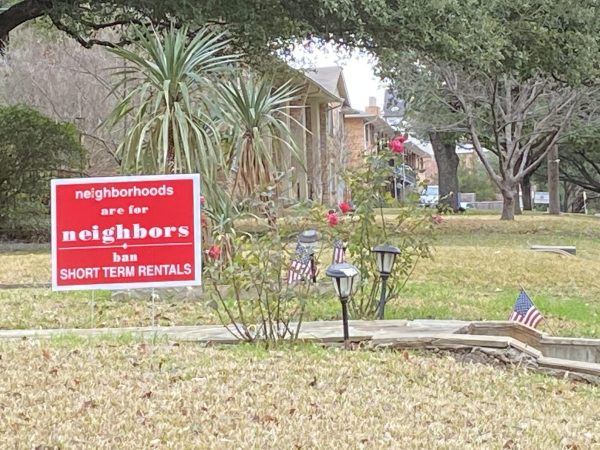
Photo by Jaime Dunaway-Seale.
The Dallas City Council will be briefed on proposed recommendations for regulating short-term rentals.
The Quality of Life, Arts and Culture Committee voted unanimously Tuesday to include the full Council in the discussion around STRs after hearing a presentation on the short-term rental task force’s recommendations.
Members of the task force included representatives from District 7, District 3, District 14 and District 6, an owner-occupied STR owner, a commercial STR operator and someone from a STR platform.
Here’s what came from the task force:
- The group was in favor of a licensing and registration program for a fee at 100% cost recovery.
- Six members of the group were in favor of allowing three adults bedroom. Two were against it.
- All members voted in favor of prohibiting on-site advertising as a STR.
- Regulations of noise and sound equipment should be addressed through Chapter 30 of the Dallas City Code.
- Five members voted in favor of an STR owner posting emergency contact information inside the STR for guests. They also voted in favor of neighbors within 100 feet being provided an emergency contact of the STR owner and being asked to call 311 with complaints. Two members voted against it.
- Four members voted in favor of parking requirements for the STR in non-single-family areas to meet the requirements of the planned development district. Three members voted against it.
Neighbors have long been complaining about STRs in their neighborhoods. But others see these properties as a way to generate additional income.
“This is not an issue where I believe there is a black or white answer to,” said District 7 City Council member Adam Bazaldua. “There is not a silver bullet.”
The task force also created a flow chart to regulate STRs. See the full presentation here.
“The task force failed to suggest a means of identifying short-term rental hotels in order to enforce the registration program and the regulations proposed,” said District 14 City Council member Paul Ridley, who is on the committee.
Ridley said by making the flow chart, the task force was addressing a land-use issue because it allows STRs to be licensed in residential districts. The City Plan Commission needs to take up this zoning issue before the City Council can vote on an ordinance, Ridley said.
A representative from the City Attorney’s Office said at the meeting Code Compliance could issue notices of violation at STRs, but that’s the end of regulation. There’s currently no way beyond that to prohibit STRs from operating after, for example, a certain number of noise or trash violations.
STRs are supposed to pay a hotel occupancy tax, but not all of them do because not all of them are registered.
“The only way to enforce rules regulating the operations of STRs is to make the listing platforms accountable because they all rely upon the listing platforms to reach their audience,” Ridley said.
But Bazaldua, the chair of the Quality of Life, Arts and Culture committee, said some regulations should be considered now, instead of passing the whole thing off as a zoning issue.
“Now it’s time for the policy body to actually take up what is just recommendations and see what can be implemented now to provide some sort of immediate relief,” Bazaldua said. “Right now, we cannot blindly put all of our eggs into the basket that provides no immediate relief and no clear legal outcome. We throw this to ZOAC, and two years from now, there’s legal precedents set that tell us we can’t regulate them through zoning. We have then lost another two years.”
If regulation and zoning ordinances are passed separately, there could be issues. Courts could decide that any STRs that have already been permitted to operate could be grandfathered in, and their permits couldn’t be suspended or revoked.
Toward the end of the meeting, District 9 City Council member Paula Blackmon made a motion.
“I request a full briefing to the full City Council on the STR process including the potential moratorium with an emphasis of sending this back to CPC/ZOAC for zoning considerations with timelines included,” Blackmon said.
The committee unanimously passed the motion.
Blackmon said she wanted to give the whole City Council an opportunity to weigh in on an issue that affects all parts of the city.
“We are under a crunch, and I am done messing with this,” Blackmon said. “We’ve got to make action that makes sense, that does something.”





